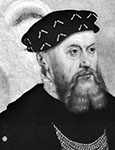Christian IIII.
|
 |
born Aug. 12, 1503, Gottorp, Schleswig
died Jan. 1, 1559, Kolding, Denmark
King of Denmark and Norway (1534–59) who established the state Lutheran Church in Denmark (1536) and, by forming close ties between the church and the crown, laid the foundation for the absolutist Danish monarchy of the 17th century.
The eldest son of Frederick I, king of Denmark and Norway, Christian was educated as a Lutheran and showed Protestant zeal as statholder (chief executive) in the Danish provinces of Schleswig and Holstein (1526). The predominantly Catholic state council therefore rejected his bid for the throne when Frederick died in 1533, preferring Christian's younger brother Hans. Meanwhile, the burgomasters of Copenhagen and Malmö allied with the north German city of Lübeck to restore the imprisoned former Danish king Christian II and provoked a civil war (the Count's War; 1533–36) when Lübeck's forces invaded Holstein.
After gaining the backing of leading Jutland nobles and bishops (1534), Christian sponsored successful military campaigns in the provinces of Jutland, Fyn, and Zealand and, with the capitulation of Copenhagen (1536), he assumed control of the kingdom. He soon arrested the Catholic bishops and organized the Diet of Copenhagen (October 1536), which confiscated episcopal property and established the state Lutheran Church. The Diet also confirmed the constitutional rights of the nobles' Rigsråd (state council), which thereafter ruled in alliance with the King. The continuing decline of Norway was indicated by the abolition of the Norwegian state council.
In 1537 the Danish Church was reorganized under the leadership of Christian's adviser Johann Bugenhagen. New bishops were appointed, all of bourgeois origins, and the church leaders were now called superintendents. Christian's chancellor, Johan Friis, maintained good relations between the crown and the leading nobles and helped modernize the local and national administrations.
In foreign affairs, Christian allied with the Protestant German rulers against the Habsburg Holy Roman emperor Charles V, who wanted to place the daughters of Christian II on the Scandinavian thrones. After settling his debt to Holstein in 1542, Christian declared war against Karl V. (1500-1558) and closed The Sound (Øresund), the entrance to the Baltic Sea, to shipping from the Netherlands; this was a serious economic blow to the Emperor. He concluded a peace with Charles at Speyer in 1544 and thereafter avoided interference in foreign wars. He gained the Emperor's favour especially for his noninterference in the war of the Schmalkaldic League (1546–47), a dispute between Charles and the Protestant Estates of his empire.
Copyright © 1994-2002 Encyclopædia Britannica, Inc.
![]()
Sources
- Encylopedia Britannica 2002, Expanded Edition DVD
Web





